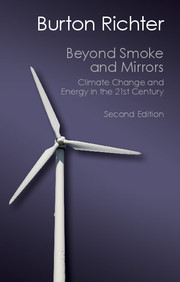Book contents
- Frontmatter
- Contents
- Preface to the Second Edition
- List of Units
- List of Conversion Factors
- List of Abbreviations
- 1 Introduction
- Part I Climate
- Part II Energy
- 6 Taking up Arms Against this Sea of Troubles
- 7 How Fast to Move: A Physicist’s Look at the Economists
- 8 Energy, Emissions, and Action
- 9 Fossil Fuels – How Much Is There?
- 10 Electricity, Emissions, and Pricing Carbon
- 11 Efficiency: the First Priority
- 12 Nuclear Energy
- 13 Renewables
- 14 Biofuels: Is There Anything There?
- 15 An Energy Summary
- Part III Policy
- References
- Index
15 - An Energy Summary
Published online by Cambridge University Press: 05 November 2014
- Frontmatter
- Contents
- Preface to the Second Edition
- List of Units
- List of Conversion Factors
- List of Abbreviations
- 1 Introduction
- Part I Climate
- Part II Energy
- 6 Taking up Arms Against this Sea of Troubles
- 7 How Fast to Move: A Physicist’s Look at the Economists
- 8 Energy, Emissions, and Action
- 9 Fossil Fuels – How Much Is There?
- 10 Electricity, Emissions, and Pricing Carbon
- 11 Efficiency: the First Priority
- 12 Nuclear Energy
- 13 Renewables
- 14 Biofuels: Is There Anything There?
- 15 An Energy Summary
- Part III Policy
- References
- Index
Summary
The Size of the Problem
Part II has covered the energy scene. Part III is on policy, both for the United States and internationally. However, policy has to be based on reality, so I want to summarize the important technical and fiscal points. I have tried in Part II to present all the facts without prejudice, but here I will let my own opinions shine through and end this chapter with a repeat of the energy scorecard shown earlier.
It is appropriate to begin by repeating something I wrote in the Introduction to this second edition: “There is also a need to take a view broader than just climate change when thinking about, and planning, an energy future that takes into account the aspirations of the developing world and the national security interests of all. Just telling a poor nation that they have to do something about climate change is not enough to get action if that action will keep them poor for a longer time.”
In the section on fossil fuels I showed that we cannot handle the economic aspirations of a world of 10 billion people in the year 2100 without a crippling rise in the price of coal and oil. A change in world primary-energy sources is necessary on grounds separate from climate change, and we need to get on with it because the sooner we start the lower the eventual cost will be. Business as usual is not an option on economic and national security grounds as well as on the grounds of climate change.
We are in a race to reduce global emissions of greenhouse gases while energy demand is going up fast, driven by two things: a projected 50% increase in population, and an increase in world per capita income. Continuing on our present course, world primary energy demand is expected to double by 2050 and double again by 2100, mainly because of what is happening in the developing world.
- Type
- Chapter
- Information
- Beyond Smoke and MirrorsClimate Change and Energy in the 21st Century, pp. 291 - 312Publisher: Cambridge University PressPrint publication year: 2014

